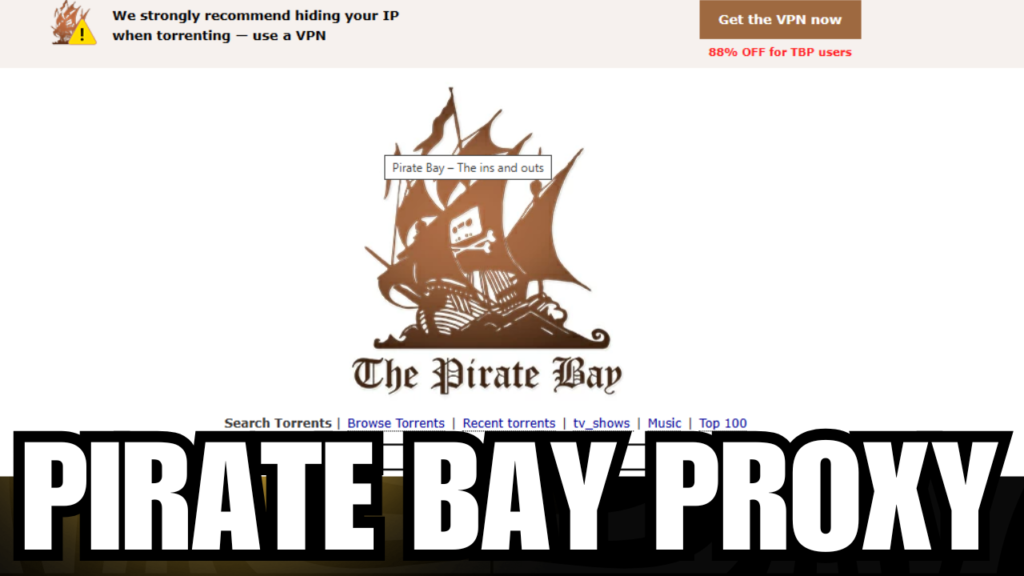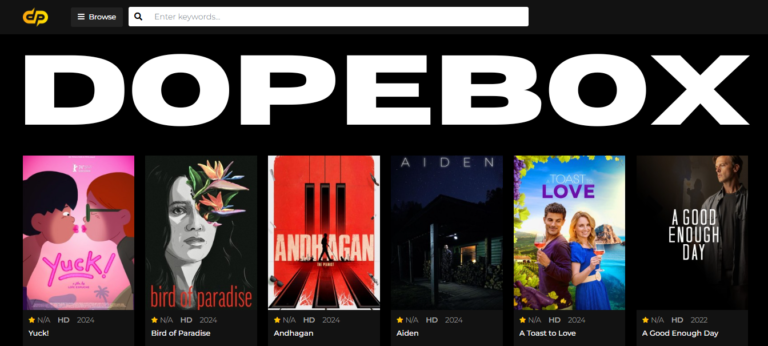
The Pirate Bay (TPB) has long been at the center of the internet’s battle over digital rights, freedom of information, and online piracy. Launched in 2003, TPB quickly became one of the most popular torrent websites, providing users with access to an immense library of digital content ranging from music and movies to software and eBooks. However, as the site became more popular, it also became a target for law enforcement agencies, copyright holders, and governments around the world who sought to shut it down. Despite efforts to block and censor access to TPB, one tool has continued to allow users to bypass restrictions: the Pirate Bay proxy.
In this article, we will explore the concept of a Pirate Bay proxy, its significance in the broader context of internet freedom, and how it works. We will also look at the history of The Pirate Bay, why it is targeted by authorities, and the legal implications of using proxies to access TPB. Whether you are an experienced user of the site or a newcomer looking to learn more, this article will provide comprehensive insights into how Pirate Bay proxies operate and why they are so important in today’s internet landscape.
Introduction to The Pirate Bay
The Pirate Bay, often referred to as TPB, is one of the most famous torrent websites in the world. Founded in 2003 by Swedish anti-copyright activists, TPB quickly gained traction as a platform for sharing files using the BitTorrent protocol. Unlike traditional file-sharing websites, which hosted content directly, The Pirate Bay provided users with links to torrent files that allowed them to download content from other users.
History of The Pirate Bay
The Pirate Bay was founded by four Swedish men: Fredrik Neij, Gottfrid Svartholm, Peter Sunde, and Carl Lundström. The site’s primary goal was to offer a platform for users to share files without censorship or government interference. Over time, TPB grew exponentially, attracting millions of visitors from around the world.
In 2006, TPB was raided by Swedish authorities, leading to the seizure of servers and the arrest of its founders. Despite facing legal challenges and ongoing efforts to shut it down, TPB continued to operate, often moving its servers to new countries to evade legal pressure. The site became a symbol of internet freedom, piracy, and defiance against copyright laws.
The Rise of Torrenting
The advent of torrenting revolutionized file sharing, making it faster, more efficient, and decentralized. The BitTorrent protocol, which underpins The Pirate Bay, allows users to download pieces of a file from multiple sources simultaneously, improving download speeds and reliability. TPB became a hub for this new type of sharing, offering torrents for movies, TV shows, games, music, software, and even books.
👉🏻 Working Site https://piratebayproxy.info/
TPB’s Reputation as a Hub for Digital Piracy
While TPB originally marketed itself as a site for sharing content legally, it soon became synonymous with digital piracy. Major movie studios, record labels, and software developers accused TPB of facilitating the illegal distribution of copyrighted materials. As a result, TPB was subject to numerous legal battles and injunctions, but it continued to thrive due to its loyal user base and the decentralized nature of torrenting.
What is a Pirate Bay Proxy?
A Pirate Bay proxy is a website that serves as an intermediary between a user and The Pirate Bay’s original site. These proxies allow users to access TPB’s content even when the main website is blocked or censored. By using a proxy, users can bypass government or ISP-imposed restrictions and continue downloading torrents from TPB.
Defining a Proxy in the Context of TPB
A proxy server acts as a gateway between a user’s device and the websites they want to access. When a user connects to a proxy, their request to access a website (in this case, TPB) is redirected through the proxy server, which then fetches the content and sends it back to the user. This process hides the user’s identity and location from the target website, making it difficult for authorities or ISPs to track or block access.
How Proxies Help Users Access Restricted Content
Proxies can be particularly useful when TPB is blocked by ISPs or governments. Instead of visiting the main website, which may be blacklisted, users can visit a proxy site that acts as an alternative access point to TPB. The proxy will typically mirror the content of the original site, allowing users to search, download, and interact with TPB’s database of torrents.
Legal and Ethical Implications of Using TPB Proxies
The use of TPB proxies raises legal and ethical questions. In many countries, accessing torrent sites like TPB is illegal because the site hosts copyrighted content without permission. By using proxies, users can circumvent these restrictions, which might lead to legal repercussions in certain jurisdictions. Additionally, while some argue that proxies enable internet freedom, others believe that they facilitate piracy and harm the entertainment and tech industries.
You May Like YesMovies: Features, Legal Issues, Alternatives, and More
Why is The Pirate Bay Blocked?
The Pirate Bay has been the target of numerous legal challenges due to its association with piracy. Many governments and copyright enforcement agencies see TPB as a significant threat to intellectual property rights and have taken steps to block the site.
Legal Issues and Lawsuits Against TPB
Over the years, TPB’s founders and operators have faced multiple lawsuits from major content creators, including Hollywood studios, music labels, and software companies. In some cases, TPB has been ordered to pay millions of dollars in damages. The Swedish authorities have also charged the site’s founders with various crimes, including copyright infringement, illegal distribution, and money laundering.
Internet Censorship and Content Blocking Worldwide
The desire to block access to TPB is not limited to Sweden. In many countries, ISPs have been compelled by governments to block or restrict access to the site. For example, in the United Kingdom, internet providers have been ordered by courts to block access to TPB, while countries like Australia, India, and the United States have followed suit.
Governments argue that blocking pirate websites helps protect copyright holders and reduces illegal file sharing. However, many users see this as an infringement on freedom of expression and an overreach by authorities.
The Role of ISPs and Governments in Blocking TPB
ISPs play a central role in blocking access to TPB. When a website is deemed illegal or harmful, ISPs may block its IP address or implement DNS filtering to prevent users from accessing it. However, the rise of proxies and VPNs has made it harder for authorities to enforce these blocks, as users can easily circumvent restrictions.
How Do Pirate Bay Proxies Work?
To understand how Pirate Bay proxies function, it is important to grasp how proxies, in general, work and how they are configured to bypass censorship.
Technical Explanation of How Proxies Bypass Restrictions
When a user accesses a website through a proxy, their connection is routed through the proxy server. The proxy server then forwards the request to the website, collects the data, and sends it back to the user. In the case of a Pirate Bay proxy, the proxy server effectively mirrors the original TPB website, allowing users to interact with TPB without directly visiting the blocked domain.
Proxies may also use techniques like IP address obfuscation or DNS manipulation to prevent website blocking by authorities. Some proxies are specifically designed to disguise the true origin of requests, making it harder for authorities to detect the traffic.
Differences Between TPB Proxies and VPNs
While both proxies and VPNs (Virtual Private Networks) serve similar purposes—bypassing censorship and protecting privacy—there are key differences between the two. Proxies only route traffic for specific applications (e.g., web browsers), while VPNs create a secure, encrypted tunnel for all internet traffic. VPNs provide more robust security and privacy, but proxies tend to be easier to use and more lightweight.
How to Use a pirate bay proxy Step-by-Step
- Find a reliable pirate bay proxy: Look for a proxy website that mirrors the Pirate Bay content. Make sure it is up-to-date and safe.
- Access the proxy site: Visit the proxy URL in your web browser.
- Browse TPB content: Use the proxy site as you would use the main Pirate Bay website. Search for torrents and download them.
- Verify the safety of the torrent: Be cautious of fake or malicious torrents. Use trusted torrent sources and avoid downloading suspicious files.
Types of Pirate Bay Proxies
There are different types of proxies used to access The Pirate Bay, and they can vary in their functionality and reliability.
Mirror Sites
Mirror sites are exact replicas of the original Pirate Bay website. They offer the same content, but they are hosted on different domains or servers to avoid blocking. Mirror sites may also be used to maintain the site’s availability if the main domain is taken down.
Must Read Primewire: A Comprehensive Guide to the Streaming Platform
Dedicated Pirate Bay Proxy Websites
Some websites are dedicated solely to providing proxy access to TPB. These proxy websites usually feature a user-friendly interface and offer an easy way to access TPB content. Examples of such sites include “thepiratebay.org” proxies or “tpb.pro” proxies.
Public vs. Private Proxies
Public proxies are accessible to anyone, but they can be slow and unreliable due to heavy traffic. Private proxies, on the other hand, are paid services that offer better performance, security, and stability. For users who require consistent and fast access to TPB, private proxies are often the better choice.
The Role of VPNs in Accessing The Pirate Bay
Virtual Private Networks (VPNs) have become one of the most effective tools for protecting privacy online, and they play an important role in helping users access websites like The Pirate Bay (TPB). As authorities and Internet Service Providers (ISPs) work to block access to torrent sites, VPNs offer a way to bypass these restrictions while also protecting users from potential legal or cyber threats.
How VPNs Work
A VPN works by creating an encrypted tunnel between the user’s device and a VPN server located elsewhere. This means that all of the user’s internet traffic is routed through this server, and their real IP address is replaced with the IP address of the VPN server. In doing so, the VPN makes the user’s internet activity difficult for third parties—such as ISPs, governments, or hackers—to track. Additionally, VPNs mask the user’s geographical location, which helps bypass geo-restrictions and blocks imposed on websites like TPB.
VPNs vs. Proxies for TPB Access
While both VPNs and proxies allow users to access blocked content, they work in different ways. A proxy simply redirects traffic to another server, making it appear as though the user is accessing the internet from a different location. However, proxies don’t offer the same level of encryption or privacy as VPNs.
In contrast, VPNs provide robust encryption, which ensures that any data sent between the user’s device and the VPN server is protected. This adds an extra layer of security, which is particularly important when accessing potentially risky sites like TPB. A VPN also works for all internet traffic, not just web browsing, which is a significant advantage over proxies that are typically only useful for specific applications (like browsers or torrent clients).
Why VPNs Are Preferred for Torrenting
VPNs are widely preferred by torrent users because they offer both anonymity and security. They prevent ISPs from monitoring torrenting activities and protect the user’s data from hackers who may target torrent users. For people who want to access TPB safely, a VPN ensures that the user’s IP address is hidden and that they aren’t easily tracked by copyright enforcement agencies.
The Ethics of Torrenting and Using TPB Proxies
The ethics of torrenting and using proxies to access sites like The Pirate Bay have been subjects of intense debate. While some people see torrenting as a means of circumventing unfair copyright laws or promoting free access to information, others view it as theft that harms content creators and the entertainment industry.
Arguments in Favor of Torrenting
Advocates of torrenting argue that it is a form of digital freedom and a protest against the monopolistic practices of large corporations. They believe that digital content should not be bound by restrictive licensing agreements or regional availability. Torrenting allows users to access content that may not be available in their region or is priced unfairly.
In some cases, torrenting is also seen as a tool for the distribution of open-source software, educational materials, and public domain works. Supporters of this perspective argue that these kinds of files can be freely shared without violating copyright laws or causing harm to content creators.
Arguments Against Torrenting
On the other hand, many content creators, artists, and legal experts argue that torrenting is a form of theft. By downloading or sharing copyrighted content without paying for it, torrent users bypass the creators’ rights to earn revenue from their work. This directly affects industries such as film, music, and software development, where revenue from content distribution is essential for funding future projects.
Using TPB proxies to access torrents further complicates the issue, as users are circumventing legal barriers put in place to protect the intellectual property of creators. For copyright holders, the rampant use of proxy sites to bypass access restrictions can feel like a direct violation of their rights.
Ethical Considerations of TPB Proxies
The use of TPB proxies raises additional ethical concerns. While proxies allow users to access TPB even when it is blocked or censored, they also make it harder for authorities and copyright enforcement agencies to track illegal torrenting activities. This can embolden users to download copyrighted content without considering the consequences, knowing that their actions are harder to trace.
Despite these ethical dilemmas, some argue that the debate over torrenting should include the question of whether current copyright laws are too restrictive or outdated. As digital content becomes more easily shareable, the traditional models of ownership and distribution are being challenged.
Risks and Challenges of Using TPB Proxies
While TPB proxies offer an effective way to bypass restrictions, there are several risks and challenges associated with their use. These include security risks, unreliable access, and legal consequences.
Security Risks
One of the biggest risks of using TPB proxies is exposure to malware and other types of cyberattacks. Proxies are not always secure, and some of them may even host malicious software that can infect your device. Many proxy sites, especially lesser-known ones, may use pop-up ads or other deceptive tactics to lure users into downloading harmful files. This is particularly dangerous when downloading torrents from TPB, as some torrent files may also contain viruses or other types of malware.
Additionally, not all TPB proxies offer encryption, which means your data could be exposed while you are browsing or downloading files. This leaves users vulnerable to cyberattacks, hacking, or eavesdropping, especially when using public or unsecured networks.
Unreliable Access
Another challenge is the potential for unreliable access to TPB through proxies. Because proxy sites often change their domains to avoid detection, some proxies may go offline without notice. This can lead to frustration as users may find themselves unable to access TPB for extended periods of time. In some cases, users may need to search for a working proxy or try multiple options, which can be time-consuming.
Moreover, many pirate bay proxy sites operate on a volunteer or ad-supported basis, meaning they may not have the resources to ensure stable and fast performance. Proxies can sometimes result in slower download speeds, interruptions, or even errors that prevent users from accessing the content they need.
Legal Consequences
One of the most significant risks of using TPB proxies is the potential for legal consequences. While accessing TPB through a proxy may provide anonymity, it does not make torrenting legal. In many countries, downloading or sharing copyrighted content without authorization is a violation of intellectual property laws, and authorities can take action against users who engage in illegal activities.
Users should be aware that although proxies may shield their identities, they do not guarantee complete protection from legal scrutiny. In some cases, copyright holders have taken legal action against individuals who download or share torrents, and authorities may track down users through various means, such as IP address monitoring, despite the use of proxies or VPNs.
Love This SolarMovies – The Ultimate Streaming Experience in 2024
Alternatives to The Pirate Bay
Despite The Pirate Bay’s popularity, there are several alternatives for users who are seeking torrents or similar content. While some of these sites face similar legal challenges and censorship, they offer a variety of content for users who prefer not to use TPB.
1337x
1337x is a popular torrent site that has been around since 2007. It offers a wide range of content, including movies, TV shows, games, and software. Despite facing occasional outages and legal challenges, it remains a trusted alternative to TPB.
RARBG
RARBG is another well-known torrent site that offers high-quality torrents for a variety of media types. RARBG is known for its user-friendly interface and reliable torrents. However, like TPB, it faces ongoing legal pressure and censorship attempts in some countries.
YTS
YTS (formerly known as YIFY) specializes in high-quality movie torrents, particularly focusing on providing small file sizes without sacrificing too much quality. YTS is one of the more popular alternatives for users looking to download movies.
Legal Streaming Services
In addition to torrenting sites, there are a number of legal alternatives to TPB for streaming or downloading content. Services like Netflix, Hulu, Amazon Prime Video, Disney+, and YouTube offer a vast array of movies, TV shows, and documentaries for a subscription fee. These platforms have become increasingly competitive in terms of content offerings, and they often provide high-quality, legal options for consumers.
Conclusion on pirate bay proxy
The pirate bay proxy, despite being one of the most infamous torrent sites in the world, continues to attract millions of users each month. Its role in providing access to a wealth of content, both legal and illegal, has led to its ongoing battle with governments, copyright holders, and ISPs. For many, TPB proxies serve as a necessary tool to bypass blocks and access content, but they come with significant risks.
VPNs, proxies, and legal alternatives all play different roles in the broader ecosystem of online content sharing and access. While some users may feel justified in using TPB proxies for the sake of internet freedom and access to information, the ethical and legal ramifications of torrenting and using proxies cannot be ignored.
As censorship and legal pressure increase, the future of TPB and similar sites remains uncertain. However, the ongoing demand for online privacy and uncensored content suggests that the battle between internet freedom and control will continue, with tools like VPNs and proxies playing a crucial role in this dynamic landscape.







